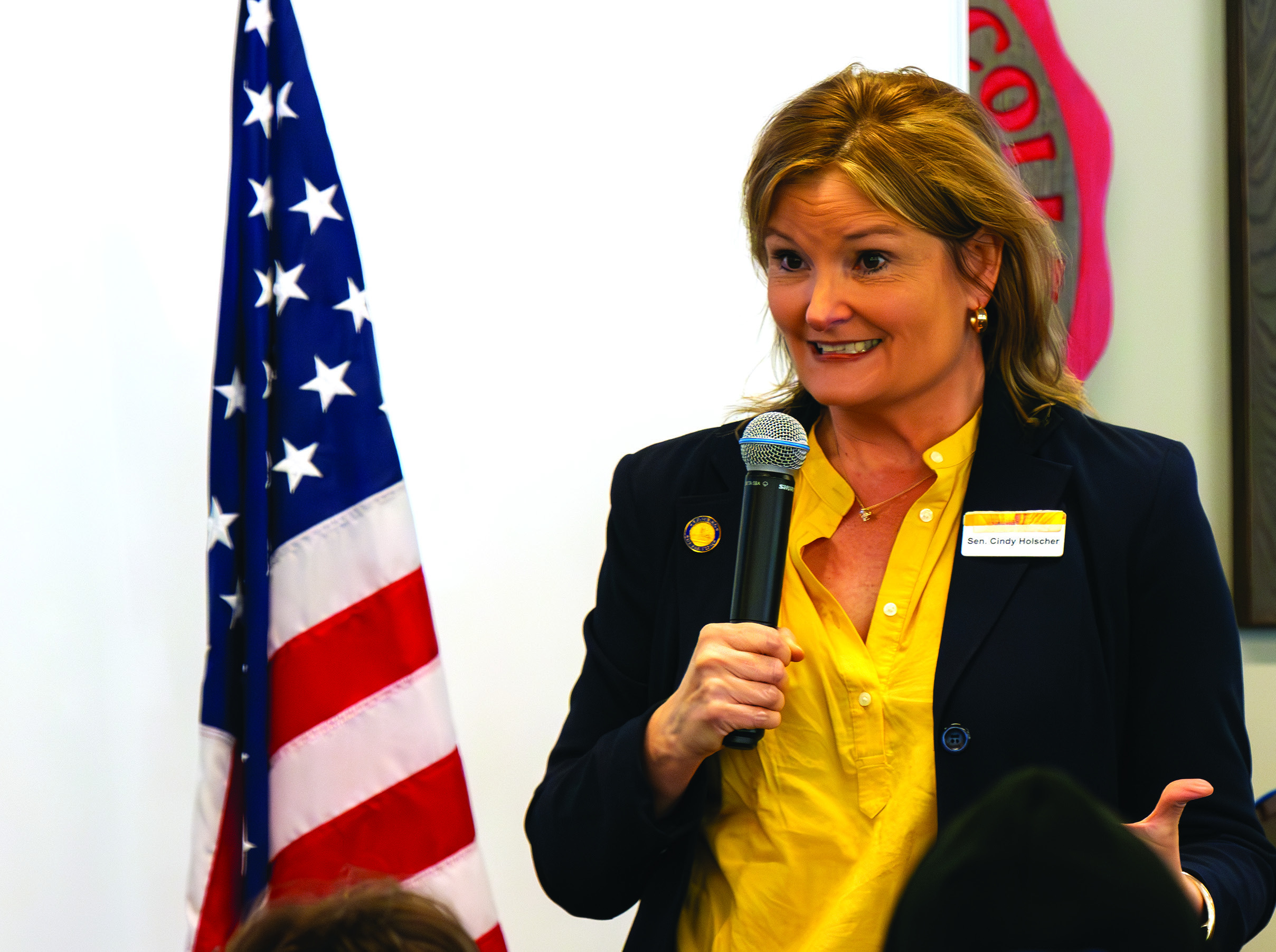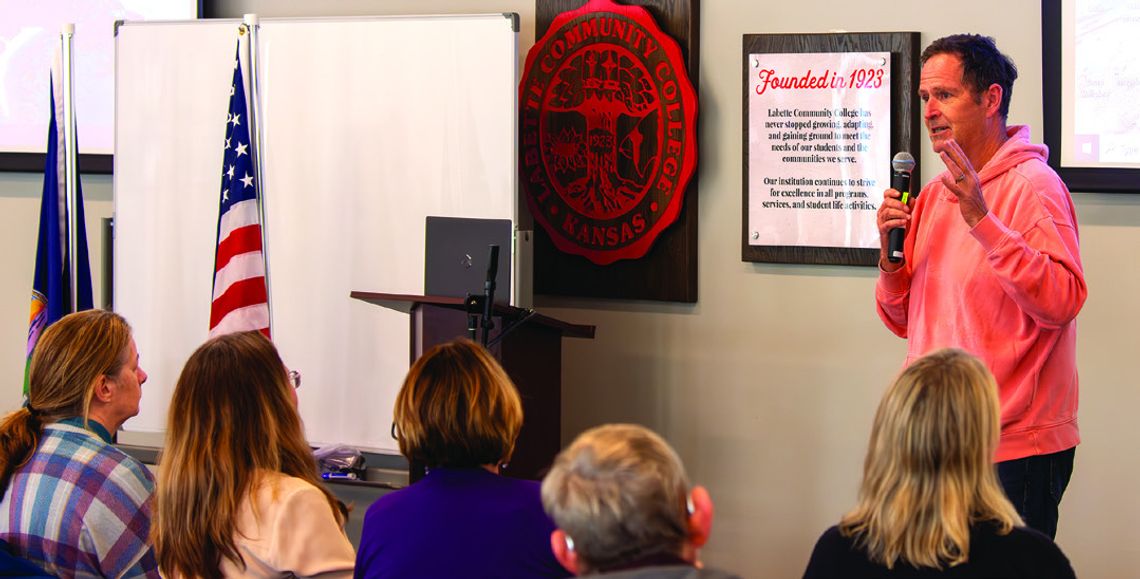Kansas Sen. Cindy Holscher, an Overland Park Democrat, was the only state lawmaker to attend a town hall-style meeting in Parsons on Saturday.
Federal and state Republican lawmakers were invited but didn’t show up. Their pictures were placed on empty seats in the Cardinal Event Center, 13th and Main. Goddard originally said he would attend but withdrew last week. None of the other lawmakers reportedly responded to the invitation, organizers of the event said. Schmidt posted pictures on his House campaign Facebook page about attending an event in Geary County.
Holscher was about 45 minutes late to the event, but other local Democrats spoke until she arrived. Saturday was also the day for planned “Hands Off” rallies across the nation protesting the Trump administration and its actions, as well as billionaire Elon Musk and the Department of Government Efficiency. One such rally happened in Pittsburg Saturday afternoon, after the town hall meeting, and several in attendance at the town hall in Parsons planned on traveling to Pittsburg with their signs. Holscher was to attend the rally as well.
Leland Crooks, a Parsons city commissioner, spoke briefly at the town hall and encouraged people to get involved in their local government by attending meetings or seeking office.
He said Parsons has been able to get big projects done because of the grants or funding it receives from the state and federal government. This includes money for infrastructure improvements and starting a domestic violence unit for the Parsons Police Department.
“That’s going to dry up. Because we’re all going to be left holding the bag,” Crooks said about these funding streams.
No one wants to raise taxes, but cities and counties will be in dire straits. Parsons, he said, will never again see the population numbers that it had in the 1960s and 1970s. The plan must be to craft towns into something new. The process will be helped by local citizen involvement.
He said two city commission seats will be up for election in 2026. He said the commission has a good balance right now, but an election could change that in a heartbeat.
See TOWN HALL, Page 4.

State Sen. Cindy Holscher speaks on Saturday afternoon to a crowd at the Cardinal Event Center, 13th and Main, in Parsons. The Labette County Democrats organized the town hall style meeting. Republican lawmakers (Sens. Jerry Moran and Roger Marshall, U.S. Rep. Derek Schmidt, state Sen. Virgil Peck and state Rep. Dan Goddard) were invited but none showed. Goddard originally said he would attend but withdrew last week. BELOW: Parsons City Commissioner Leland Crooks spoke briefly on Saturday. Ray Nolting/Sun photo
“We can effect change here quickly, far faster than we can at a national level,” Crooks said of local boards and commissions.
Holscher served two terms in the state House and has been in the state Senate since 2020. She first got involved in state politics during the Gov. Sam Brownback era.
She said public schools have been under attack each year by conservative Republicans in the Statehouse. The push is to defund schools and now there is a renewed effort to implement school vouchers, but it’s called school choice. She said the group pushing back against the GOP supermajority on this issue has gotten smaller each session.
“We can’t continue the way it is,” she said. She encouraged political involvement and running for state office. She said she would work with Democrats, Republicans or Independents.
“I just want reasonable people,” she said. A $10 million initiative called Blueprint for Literacy was brought before the Legislature last year to address low reading scores in schools. The Legislature passed it and Gov. Laura Kelly signed it into law in 2024. The program was a collaboration among the Kansas Board of Regents, Kansas State Board of Education, state universities and K-12 teachers.
However, the young initiative wasn’t funded for the next budget cycle.
“I don’t know how we’re supposed to raise our scores if we don’t fund the tools that are needed,” Holscher said.
She said she cannot support school choice. She supports investing in communities, investing in the state’s youth and investing in working people. School choice or vouchers would allow parents to send their children to private schools by redirecting funding meant for public schools.
Holscher said these initiatives have done poorly in other states. The vouchers likely wouldn’t cover the cost of sending a student to a private school, she said, and about 70% of this money would go toward families whose children already attend private schools. Funding two school systems like this will make public schools a shell of what they once were, she said.
According to the Economic Policy Institute, a nonprofit, nonpartisan think tank, universal voucher programs for schools are rapidly expanding across the country. Under these programs, states give parents stipends to either homeschool their children or send them to private schools.
Instead of boosting student achievement in equitable and cost-effective ways, voucher programs generally end up putting bigger, new demands on state and local budgets and increasing the cost of educating students who remain in public school, according to an EPI report.
“In Arizona, for example, where 75% of voucher program users are already in private school (SOS 2024), legislators grossly underestimated the cost of voucher programs — by tenfold. The voucher program was initially projected to cost $65 million in 2023 but actually cost upwards of $708 million. Because of these overruns, Arizona’s voucher policy is now leading to a state budget crisis (Hager 2024),” the report said.
There are few private schools west of Topeka, so the voucher program would go in part to support schools in Holscher’s neighborhood.
She encouraged people to reach out to lawmakers to share opinions on issues in front of the Legislature, which began its veto session this week. She said if a lawmaker doesn’t respond to an email, the citizen should copy the email to other lawmakers so the local representative could not claim that he or she never received it. While she doesn’t represent people in Labette County, what she votes on impacts the entire state. She said citizens could CC her in this correspondence to local lawmakers.
“We don’t want to give them that easy excuse,” she said. She also discussed Medicaid expansion, an initiative that most Kansans and hospitals support. But conservative Republicans do not and they have a supermajority in the Legislature and control what bills get hearings. Advocacy group numbers supporting expansion are also thinning.
More than 100 people attended Saturday’s event in Parsons.




